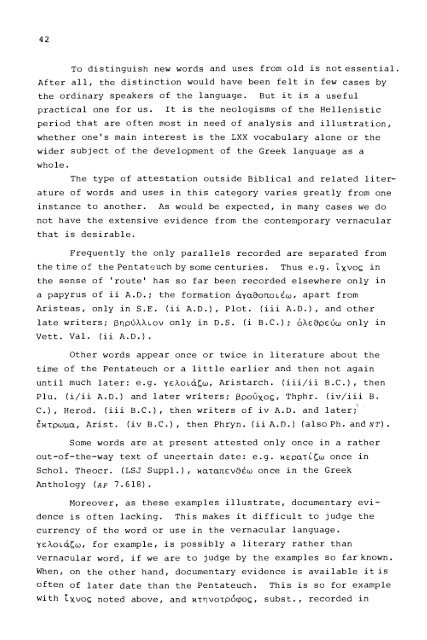A Lexical Study of the Septuagint Version of the Pentateuch
A Lexical Study of the Septuagint Version of the Pentateuch
A Lexical Study of the Septuagint Version of the Pentateuch
You also want an ePaper? Increase the reach of your titles
YUMPU automatically turns print PDFs into web optimized ePapers that Google loves.
To distinguish new words and uses from old is not essential.<br />
After all, <strong>the</strong> distinction would have been felt in few cases by<br />
<strong>the</strong> ordinary speakers <strong>of</strong> <strong>the</strong> language. But it is a useful<br />
practical one for us. It is <strong>the</strong> neologisms <strong>of</strong> <strong>the</strong> Hellenistic<br />
period that are <strong>of</strong>ten most in need <strong>of</strong> analysis and illustration,<br />
whe<strong>the</strong>r one's main interest is <strong>the</strong> LXX vocabulary alone or <strong>the</strong><br />
wider subject <strong>of</strong> <strong>the</strong> development <strong>of</strong> <strong>the</strong> Greek language as a<br />
whole.<br />
The type <strong>of</strong> attestation outside Biblical and related liter<br />
ature <strong>of</strong> words and uses in this category varies greatly from one<br />
instance to ano<strong>the</strong>r. As would be expected, in many cases we do<br />
not have <strong>the</strong> extensive evidence from <strong>the</strong> contemporary vernacular<br />
that is desirable.<br />
Frequently <strong>the</strong> only parallels recorded are separated from<br />
<strong>the</strong> time <strong>of</strong> <strong>the</strong> <strong>Pentateuch</strong> by some centuries. Thus e.g. Ιχνος in<br />
<strong>the</strong> sense <strong>of</strong> 'route' has so far been recorded elsewhere only in<br />
a papyrus <strong>of</strong> ii A.D.; <strong>the</strong> formation άγαθοττοι. έω, apart from<br />
Aristeas, only in S.E. (ii A.D.), Plot, (iii A.D.), and o<strong>the</strong>r<br />
late writers; βηρύλλιον only in D.S. (i B.C.); όλεθρεύω only in<br />
Vett. Val. (ii A.D.).<br />
O<strong>the</strong>r words appear once or twice in literature about <strong>the</strong><br />
time <strong>of</strong> <strong>the</strong> <strong>Pentateuch</strong> or a little earlier and <strong>the</strong>n not again<br />
until much later: e.g. γελοιάζω, Aristarch. (iii/ii B.C.), <strong>the</strong>n<br />
Plu. (i/ii A.D.) and later writers; βρούχος, Thphr. (iv/iii B.<br />
C.), Herod, (iii B.C.), <strong>the</strong>n writers <strong>of</strong> iv A.D. and later;<br />
έκτρωμα, Arist. (iv B.C.), <strong>the</strong>n Phryn. (ii A.D.) (also Ph. and NT) .<br />
Some words are at present attested only once in a ra<strong>the</strong>r<br />
out-<strong>of</strong>-<strong>the</strong>-way text <strong>of</strong> uncertain date: e.g. κερατίζω once in<br />
Schol. Theocr. (LSJ Suppl.), καταπενθέω once in <strong>the</strong> Greek<br />
Anthology U P 7.618).<br />
Moreover, as <strong>the</strong>se examples illustrate, documentary evi<br />
dence is <strong>of</strong>ten lacking. This makes it difficult to judge <strong>the</strong><br />
currency <strong>of</strong> <strong>the</strong> word or use in <strong>the</strong> vernacular language,<br />
γελοι,άζω, for example, is possibly a literary ra<strong>the</strong>r than<br />
vernacular word, if we are to judge by <strong>the</strong> examples so far known.<br />
When, on <strong>the</strong> o<strong>the</strong>r hand, documentary evidence is available it is<br />
<strong>of</strong>ten <strong>of</strong> later date than <strong>the</strong> <strong>Pentateuch</strong>. This is so for example<br />
with Ιχνος noted above, and κτηνοτρόφος, subst., recorded in

















